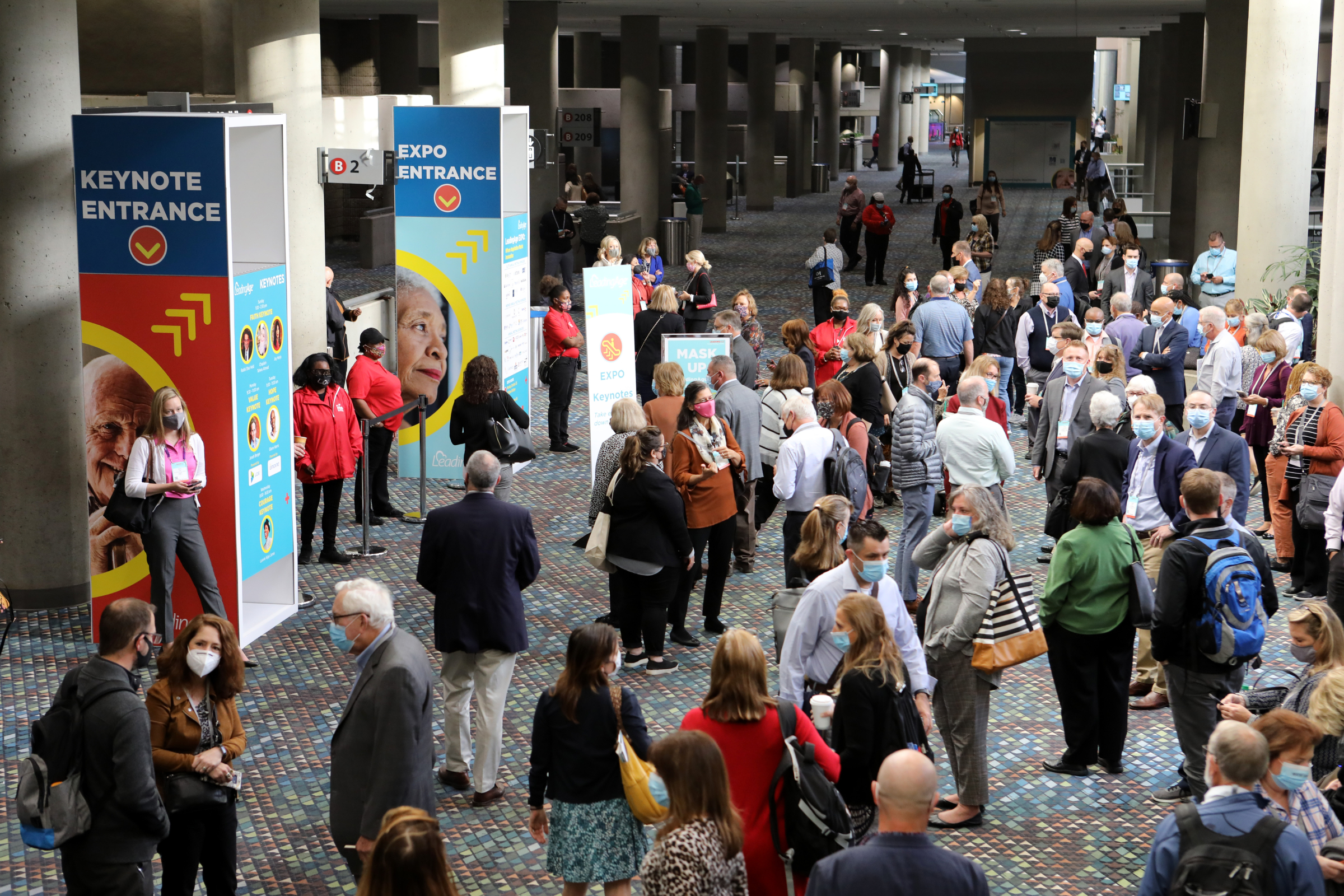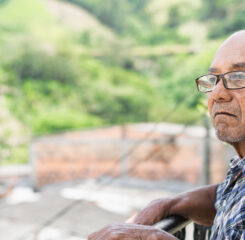Rhonda Breland-Gil Will Receive 2022 RWJF Award for Health Equity
LeadingAge has awarded the 2022 Robert Wood Johnson Foundation (RWFJ) Award for Health Equity to Rhonda Breland-Gil, a grants manager at Foundation of Wesley Woods, part of Wesley Woods Senior Living in Atlanta, GA. The award will be presented at the LeadingAge Annual Meeting and EXPO, which takes place Oct. 16-19, in Denver, CO.
Launched in 2015, the RWJF Award for Health Equity celebrates individuals who have changed systems and policies at a local level to increase the chance that everyone has a fair and just opportunity to live the healthiest life possible.
IMPROVING ACCESS TO PSYCHOTHERAPY
Breland-Gil received the Award for Health Equity for her role in helping Wesley Woods secure 11 grants, totaling $320,000, to provide free psychotherapy services to residents of Branan Towers, a Wesley community that provides housing for 178 older adults with extremely low incomes. Almost all (94%) Branan Towers residents are African American or members of another minority group.
The psychotherapy program is part of a larger outcomes-based wellness program that Wesley Woods established in 2017 across its 10 communities. While the wellness program has shown promising results in many Wesley Woods communities, Breland-Gil and the organization’s wellness director suspected that unaddressed behavioral health issues—including substance abuse, depression, anxiety, and the effects of past trauma—were making it harder for Branan Towers residents to reach their physical health goals.
The Branan Towers service coordinator had tried to connect residents with mental health services, but the barriers to such access were considerable. First, finding mental health services in the local community was difficult, and paying for those services was impossible for residents who did not have adequate insurance. Residents’ physical and cognitive challenges, and their lack of transportation to obtain services, added to the complexity. Even when affordable services could be found, many residents shunned those services, due to the stigma associated with behavioral health treatment in the African American community.
That’s where Breland-Gil came in. Working closely with the Wesley Woods Life Enrichment Team, she obtained an initial grant from Kaiser Permanente that allowed a clinical psychologist to conduct mental health assessments among a quarter of Branan Towers residents. The 2019 assessment showed that community residents were in “desperate need” of mental health services, says Breland-Gil.
“A majority of people in the sample group were suffering from either anxiety or depression or substance abuse problems or even PTSD from multiple traumas in their past,” she says. “But mental healthcare was just not a part of their lives. They could not afford treatment and their access to care was low. And that seemed such a shame because many have led lives full of challenges and full of multiple traumas. We wanted to obtain the resources to help them address those issues.”
PROMISING RESULTS
With the health assessment data in hand, Breland-Gil applied for and received a second grant from the Piedmont Healthcare Foundation that allowed Wesley Woods to establish a program that still provides free on-site psychotherapy to residents at Branan Towers. Nine additional grants from a variety of funders have made it possible for a clinical psychologist to conduct over 1,200 psychotherapy sessions with Branan Tower residents since 2020. Twenty percent of the community’s residents have sought services through the program.
Initial results are promising. From June 2021 to May 2022, for example, 80% of residents under treatment reduced their depression, as measured by the Geriatric Depression Scale. Incidents involving challenging behaviors have declined significantly. In addition, Wesley Woods has documented an 8% favorable increase in overall quality of life at the community, as measured through its bi-annual resident engagement and satisfaction survey.
“We feel the work being done to address trauma, depression, and other mental health concerns is having a direct impact on the culture of the community and the quality of life for each resident,” wrote Wesley Woods President & CEO Terry Barcroft in her letter nominating Breland-Gil for the health equity award.
Breland-Gil gives credit for the program’s success to generous funders and the clinical psychologist who has been working with Branan Towers residents for the past two years.
“Residents just really bonded with him,” she says about the psychologist. “I think they found him to be compassionate and kind of refreshing. He understands their backgrounds. And they trust him. If we didn’t have the right person in that role, it would have been significantly harder to gain acceptance for the services.”
In addition to steadily improving assessment data, the psychologist has recorded many resident success stories over the past two years. Despite the positive trends, however, Wesley Woods is not declaring victory just yet.
“Over a period of 70 or 80 years, people collect a lot of grief,” says Breland-Gil. “These residents have a lot to deal with and a lot to talk about. So, psychotherapy has to be long term in order to bring about real change.”
For this reason, Breland-Gil is committed to making sure the program’s funding continues uninterrupted. Any gaps in that funding, she fears, would put the mental health of residents at risk.
“It is always in the forefront of my mind that we need to aggressively work to fund this work,” she says. “Funding hasn’t been a challenge yet, but I always live in fear of that. People depend too much on these services to have them stop.”
GROWING INTEREST AMONG FUNDERS
Breland-Gil takes heart from the fact that foundations are more interested in funding mental health initiatives than they were five or 10 years ago. In addition, she says, Wesley Woods often stands out from other grant applicants because housing communities like Branan Towers do not usually provide psychotherapy on site and at no cost to residents.
“There’s an interest out there among funders,” she advises other housing providers. “So, if you’re seeing this need in your communities, it might be time to explore that interest.”

Most Recommended
October 15, 2025
 Shutdown Week Three: Impact of Ongoing Closure on Affordable Housing
Shutdown Week Three: Impact of Ongoing Closure on Affordable Housing
February 24, 2026
Fiscal Year (FY) Funding 2026
October 07, 2025
Immigrant Workforce Matching Program Brings Workforce Relief
Recently Added
March 03, 2026
DOL Proposes New Worker Classification Rule
March 03, 2026



